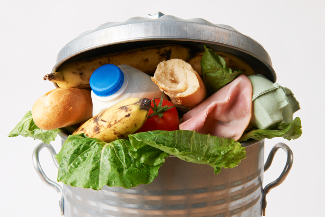Member State Page : Greece
Last updated on the 29/09/2023

Food waste data – national:
Per capita: 191 kg in 2020
In total: 2 million tonnes in 2020
In total: 2 million tonnes in 2020

Food waste data – sectoral:
Primary production: 372 204 tonnes in 2020 (estimate)
Processing and manufacturing: 375 158 tonnes in 2020
Retail and other distribution of food: 150 472 tonnes in 2020
Restaurants and food services: 220 032 tonnes in 2020 (estimate)
Households: 930 323 million tonnes in 2020
Processing and manufacturing: 375 158 tonnes in 2020
Retail and other distribution of food: 150 472 tonnes in 2020
Restaurants and food services: 220 032 tonnes in 2020 (estimate)
Households: 930 323 million tonnes in 2020

Targets:
National target: By 2030, reduction of food waste along production and supply chains and 30% reduction of food waste per capita (compared to 2022) at retail and consumer level
Target
In order to reinforce national efforts towards contributing to the Sustainable Development Goal 12.3 that was adopted in 2015 by the United Nations General Assembly, the framework law on waste that was issued in July 2021 (Law 4819/2021) sets a national target to reduce food waste along production and supply chains and to reduce by 30% food waste per capita at retail and consumer level by 2030 (as compared to 2022). The target is included in the national waste prevention programme for 2030. The quantitative target will be re-evaluated by the end of 2023.
Measure
Greece is preparing the system for measuring and monitoring national food waste levels in accordance with the requirements of the Commission Delegated Decision (EU) 2019/1597. Pursuant to the provisions of the new framework law on waste, a dedicated electronic platform will be established to collect data on food waste from operators across the food supply chain from 2022 onwards, with the exception of crop production and fishing. The platform will be connected to the Electronic Waste Registry (EWR), a digital tool of the Ministry of Environment and Energy operating since 2017, through which all environmentally licensed facilities are required to submit annual waste reports.
Regarding primary production, the Ministry of Environment and Energy is currently working on a measurement methodology that will be applied to quantify food waste in crop production, in close cooperation with the Ministry of Rural Development and Food. Food waste data from the fishing sector will be gathered from the official annual reporting on discard data under the Landing Obligation, whilst data from animal production and aquaculture will be collected from the aforementioned dedicated electronic platform.
The data at household level for 2020 are based on a survey sent to a representative sample of the country’s households by using online food waste diaries on a 7-day basis, whilst the data for the retail sector are based on a dedicated study involving one of the largest supermarket chains of the country (covering about 20% of the organised food retail sector) by using a combination of counting-scanning and coefficients methods. The data on food waste production from the processing-manufacturing stage, animal production and aquaculture for 2020 are gathered from EWR through a dedicated reporting form on food waste sent to the registered facility operators. The 2020 data also include the estimates of the JRC technical report for crop production and restaurants and other food services.
Regarding primary production, the Ministry of Environment and Energy is currently working on a measurement methodology that will be applied to quantify food waste in crop production, in close cooperation with the Ministry of Rural Development and Food. Food waste data from the fishing sector will be gathered from the official annual reporting on discard data under the Landing Obligation, whilst data from animal production and aquaculture will be collected from the aforementioned dedicated electronic platform.
The data at household level for 2020 are based on a survey sent to a representative sample of the country’s households by using online food waste diaries on a 7-day basis, whilst the data for the retail sector are based on a dedicated study involving one of the largest supermarket chains of the country (covering about 20% of the organised food retail sector) by using a combination of counting-scanning and coefficients methods. The data on food waste production from the processing-manufacturing stage, animal production and aquaculture for 2020 are gathered from EWR through a dedicated reporting form on food waste sent to the registered facility operators. The 2020 data also include the estimates of the JRC technical report for crop production and restaurants and other food services.
Act
Food waste prevention has been identified as one of the priorities areas in the 2015 National Strategic Waste Prevention Plan for Greece, due to its impacts on the environment, greenhouse gas emissions and food security. The plan includes awareness raising and other communication actions to reduce food waste and promotes the establishment of voluntary agreements to prevent food waste between different actors of the food supply chain.
The 2030 National Waste Prevention Programme (NWPP) that was officially approved in April 2022 incorporates a food waste prevention programme, which includes actions to tackle food waste across all stages of food supply chain, under the following pillars of measures:
In 2021, the framework law on waste introduces the food waste hierarchy and a national food waste reduction target by 2030, sets the establishment of an electronic food waste registry to monitor food waste generation and promotes food donation. The application of the food waste hierarchy is also encouraged under the overall framework of bio-waste, which includes the obligation for the main food business operators to collect bio-waste separately, such as food service companies, food processing and manufacturing facilities, supermarkets, food markets and hotels.
Since 2014, Greece has introduced specific provisions in its national tax legislation to exempt VAT for food donation, which was amended in 2021 to expand the number of beneficiaries. According to these rules, there is an exemption from VAT for food donated to legal entities for charity or for public benefit purposes, as well as for the benefit of vulnerable social groups.
A national alliance between the public and private sectors on tackling food waste has been established in September 2020, under the auspices of the Ministry of Environment and Energy, in order to boost food waste prevention efforts at national level and to enhance public awareness of the issue, as well as to support policy decisions in the area of sustainable food systems.
The 2030 National Waste Prevention Programme (NWPP) that was officially approved in April 2022 incorporates a food waste prevention programme, which includes actions to tackle food waste across all stages of food supply chain, under the following pillars of measures:
- Improve knowledge about food waste generation;
- Support food donation for human consumption;
- Promote food waste reduction in the primary sector;
- Mobilise the food processing - manufacturing and the retail and other distribution sectors to reduce food waste;
- Implement circular economy in the catering and other food services sector (e.g. restaurants, hotels), including canteens (e.g. in schools, universities, hospitals, courts, public services), to reduce food waste;
- Inform and raise awareness among households and the catering sector about changing behaviour in food consumption and management
In 2021, the framework law on waste introduces the food waste hierarchy and a national food waste reduction target by 2030, sets the establishment of an electronic food waste registry to monitor food waste generation and promotes food donation. The application of the food waste hierarchy is also encouraged under the overall framework of bio-waste, which includes the obligation for the main food business operators to collect bio-waste separately, such as food service companies, food processing and manufacturing facilities, supermarkets, food markets and hotels.
Since 2014, Greece has introduced specific provisions in its national tax legislation to exempt VAT for food donation, which was amended in 2021 to expand the number of beneficiaries. According to these rules, there is an exemption from VAT for food donated to legal entities for charity or for public benefit purposes, as well as for the benefit of vulnerable social groups.
A national alliance between the public and private sectors on tackling food waste has been established in September 2020, under the auspices of the Ministry of Environment and Energy, in order to boost food waste prevention efforts at national level and to enhance public awareness of the issue, as well as to support policy decisions in the area of sustainable food systems.
